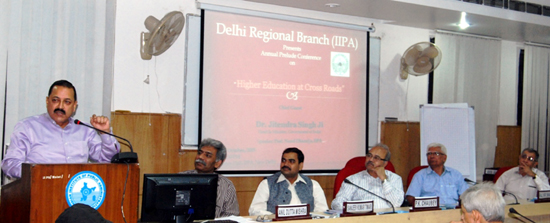
Excelsior Correspondent
NEW DELHI, Oct 11: Speaking at a seminar-cum-panel discussion on “Higher Education at Crossroads” organised by the Indian Institute of Public Administration (IIPA) here, Union Minister of State (Independent Charge) for Development of North Eastern Region (DoNER), MoS PMO, Personnel, Public Grievances, Pensions, Atomic Energy and Space, Dr Jitendra Singh called for striking the delicate balance between professional career and intrinsic aptitude and said, the ultimate bottom line is that “aptitude should not be a casualty for career”. In all such cases which face such a predicament, he said, the regret may get realised later in life but tends to stay for the rest of the life.
Narrating an interesting anecdote, Dr Jitendra Singh said, in the Cambridge University today, there is a large number of Ph.D scholars from India simply because while a British student will take up a Ph.D only if he or she has decided to devote the rest of his or her life to work in that same area of research, in India, on the other hand, a Ph.D degree, particularly from Cambridge, may often serve as a “trophy” for a lucrative job even if the job is in an area unrelated to the subject of Ph.D. At the same time, education without skill development may end up producing more number of educated unemployed resulting in further disillusionment among youth, he added.
Dwelling on the various contradictions and conflicts in education system in general and higher education in particular, Dr Jitendra Singh said, it is too trivial an assessment to limit a discussion on this subject to mere number of universities that we have or the number of new universities in the offing. He said, the point often missed in the hyperbolic discussion is that education patterns in any given period of time are to be essentially determined by the socio-economic determinants of that given period of time. Citing example, for instance, he said in the immediate post-independence era, the requirements of the national milieu were quite different. On the one hand there was the challenge of proving to the world that India could survive as an independent democratic republic and therefore the education orientation also had to be adapted accordingly, whereas in the present context, contemporary India is on the verge of emerging as a world power and the whole world, under the leadership of Prime Minister Narendra Modi, acknowledges this reality and therefore, he said, the education patterns are also to be oriented to this new emerging scenario particularly when, in the next few years, India will also become the youngest country in the world and the main resource of educated youth for the rest of the world with over 70% of its population below the age of 35.
More than the students and the youth, Dr Jitendra Singh said, it is their parents who need to be educated and made aware of, so that they do not push their children into the “run of the mill” rat-race of coaching centres and tutorials. In this regard, he suggested that Class X is to be the cut off stage after which each student should be clear as to what area of higher education he has to follow in life.
Referring to the recent revolutionary decision by the Department of Personnel & Training (DoPT) to revisit and revise the pattern and syllabus of IAS/Other Civil Services Examination, Dr Jitendra Singh said, the main spirit behind this exercise is to prepare and develop such administrators who have the aptitude instead of being there simply for the sake of a secure career.

